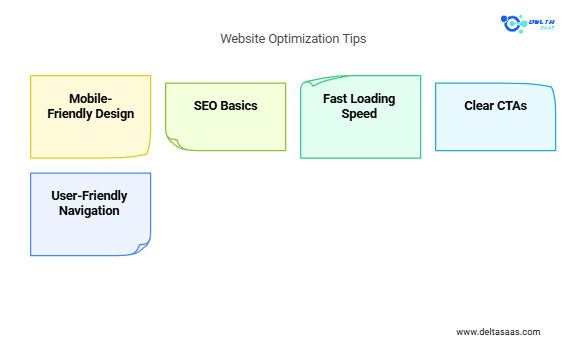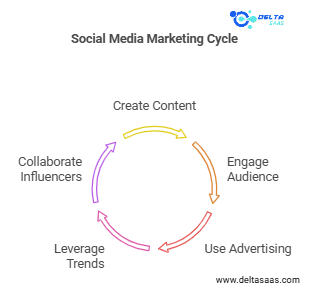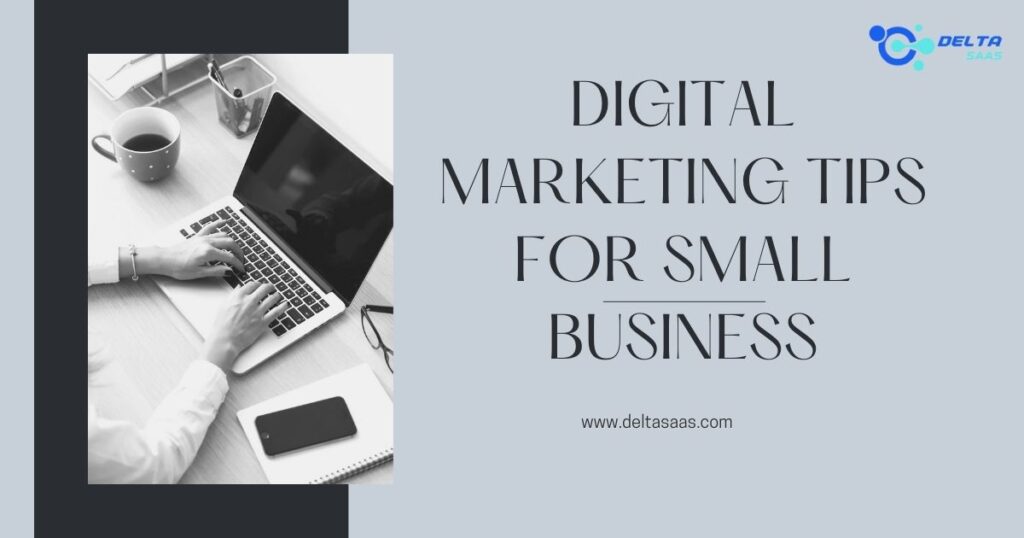
Digital Marketing Tips for Small Business
Small businesses thrive on innovative marketing strategies. Building a strong online presence in today’s digital-first world can help you connect with your audience, promote your brand, and grow your business. However, with limited budgets and resources, small business owners need tailored marketing tips to maximize their efforts. This blog provides actionable strategies to help your business succeed in digital marketing.
Understanding Your Target Audience
Why Knowing Your Audience Matters
A successful digital marketing strategy starts with understanding your target audience. Your marketing efforts will not reach the right people without knowing your customers.
Steps to Define Your Target Audience
- Demographics: Identify their age, gender, income, and location.
- Psychographics: Understand their interests, values, and challenges.
- Behavior: Study how they interact with your business. For example, do they prefer shopping online or visiting a physical store?
- Competitor Research: Analyze your competitors to see who they target and how they communicate with their audience.
For example, a bakery focusing on local SEO might target nearby customers searching for “best cakes near me.”
If you’re looking for the best software, check out Delta SaaS, which offers discounts and lifetime deals on SaaS products.
Optimize Your Website
Your website is your business’s digital storefront. Optimizing it is crucial for attracting visitors and converting them into customers.

Key Tips for Website Optimization
- Mobile-Friendly Design: Over 50% of web traffic comes from mobile devices. Ensure your website works well on smartphones.
- SEO Basics: To improve your search rankings, use relevant keywords, meta tags, and alt text for images. For example, small hospitality businesses could target terms like “home remodeling service in Miami.“
- Fast Loading Speed: Pages that take more than three seconds to load risk losing visitors.
- Clear Call-to-Actions (CTAs): Guide users with buttons like “Shop Now,” “Book a Service,” or “Learn More.”
- User-Friendly Navigation: Make it easy for customers to find important information like contact details or product categories.
Optimizing your website improves user experience and boosts your Google rankings, leading to more visibility and traffic.
Leverage Social Media Marketing
Social media marketing is one of the most effective and affordable ways to promote your small business. Platforms like Facebook, Instagram, Pinterest, X, Threads, and LinkedIn can help you connect with your audience and build brand awareness.

Social Media Marketing Ideas
- Create Interesting Content: Share behind-the-scenes stories, tips, or customer testimonials.
- Engage With Your Audience: Reply to comments and messages to build meaningful relationships.
- Use Paid Advertising: Promote specific products or services to a targeted audience with Facebook or Instagram ads.
- Leverage Trends: Create content around trending hashtags or participate in viral challenges.
- Collaborate With Influencers: Partner with micro-influencers to reach a niche audience.
For example, a small restaurant could share short videos of chefs preparing signature dishes on Instagram to engage their followers.
Also Read,
Hedy AI Lifetime Deal – Simplify Content Creation
IdeaBuddy Lifetime Deal – Plan and Launch Ideas Fast
IKI.AI Lifetime Deal – Smart AI for Business Growth
Keywords.am Lifetime Deal – Boost Your SEO Efforts
Logic Sheet Lifetime Deal – Automate Google Sheets Easily
Merlin Lifetime Deal – AI for Productivity Boost
Local SEO for Small Businesses
Local SEO helps small businesses attract customers in their immediate area. It is essential for cafes, salons, and retail shops.
How to Improve Local SEO
- Google Business Profile: Claim and optimize your listing with accurate information, photos, and customer reviews.
- Location-Based Keywords: Use phrases like “Bathroom remodeling Athen,s GA” or “plumbing services near me.”
- Encourage Online Reviews: Positive reviews boost your credibility and local search rankings.
- Add Location Pages: If your business operates in multiple locations, create separate pages for each one.
For example, a local hardware store could use location-based keywords and encourage happy customers to leave Google reviews.
Content Creation and Marketing
The Role of Content in Digital Marketing
Creating valuable and engaging content is essential for building trust and driving traffic to your website. Content marketing focuses on educating or entertaining your audience, making them more likely to engage with your brand.
Types of Content to Create
- Blog Posts: Write helpful articles on topics relevant to your industry.
- Video Marketing: Short videos explaining products or showcasing services perform well on social media or YouTube.
- Infographics: Visual content simplifies complex information and grabs attention.
- Case Studies: Share success stories to build credibility.
For example, a marketing agency could publish blog posts offering digital marketing tips for small businesses, showing expertise in the field.
Build an Email List
Email marketing remains one of the most effective ways to nurture leads and retain customers.
Tips for Building and Using an Email List
- Offer Incentives: Provide free resources, discounts, or access to exclusive content in exchange for email sign-ups.
- Segment Your List: Group subscribers based on behavior or preferences for personalized campaigns.
- Send Consistent Newsletters: Share promotions, updates, or valuable tips regularly.
For instance, a small eCommerce business can email personalized product recommendations based on a customer’s previous purchases.
Advertising and Paid Marketing Tactics
While organic efforts like SEO and social media marketing are significant, paid advertising can help small businesses achieve faster results. Advertising allows you to target specific audiences and increase the visibility of your product or service.
Types of Paid Advertising for Small Businesses
- Google Ads: These appear in search results when users type relevant keywords. For instance, a plumbing service could run ads targeting “home remodelers in Gainesville, F.L.”
- Social Media Ads: Platforms like Facebook and Instagram allow you to target users based on their demographics, interests, and behaviors.
- Video Advertising: Platforms like YouTube allow you to run video ads to reach highly engaged users.
- Display Ads: These banner ads appear on websites and can drive traffic back to your business.
Tips for Effective Paid Advertising
- Set a Budget: Start small and gradually increase your spending as you identify successful campaigns.
- Target Specific Audiences: Use age, location, and interest filters to narrow your audience.
- A/B Testing: Experiment with headlines, images, and CTAs to determine the best works.
- Monitor Metrics: To measure effectiveness, monitor click-through rates (CTR), conversions, and ROI.
For example, a retail store running an Instagram ad for a weekend sale can target local shoppers and boost foot traffic.
Influencer Marketing for Small Businesses
Influencer marketing is no longer just for big brands. Small businesses can also collaborate with influencers to promote their products or services to a highly targeted audience.
How Influencer Marketing Works
Influencers, particularly micro-influencers with smaller but engaged audiences, can promote your business through social media posts, videos, or stories.
Benefits of Influencer Marketing
- Reach a Niche Audience: Partner with influencers whose followers align with your target market.
- Boost Credibility: Influencers can build trust by recommending your brand.
- Cost-Effective: Many micro-influencers charge less compared to traditional advertising.
How to Start
- Identify Relevant Influencers: Look for influencers in your industry or local area. For example, a small-scale bakery might work with a local food blogger.
- Create a Campaign: Decide whether you want influencers to review a product, create content, or run giveaways.
- Track Results: Use unique discount codes or affiliate links to measure the campaign’s success.
Video Marketing: A Powerful Tool for Engagement
Video content is one of the most engaging forms of digital marketing. It allows small businesses to showcase their brand personality and explain their offerings effectively.
Video Marketing Ideas for Small Businesses
- Product Demonstrations: Show how your product works.
- Behind-the-Scenes Content: Give customers a glimpse into your process or team.
- Customer Testimonials: Share video reviews from satisfied customers.
- Live Videos: Engage your audience in real-time through Q&A sessions or product launches.
Tips for Successful Video Marketing
- Keep It Short: Aim for videos under 2 minutes to maintain attention.
- Use Captions: Many users watch videos without sound.
- Optimize for SEO: Use keywords in titles, descriptions, and tags to improve visibility.
For instance, a small fitness studio can create short workout tutorials to attract fitness enthusiasts on social media platforms like Instagram or YouTube.
Read More: Strong Building Customer Relationships for Success
Build Relationships With Customers
Building meaningful customer relationships is key to long-term success in digital marketing. Loyal customers are likelier to recommend your business to others and become repeat buyers.
How to Build Relationships
- Personalized Communication: Use customer data to send customized emails or recommendations.
- Engage on Social Media: Respond to comments and messages to create a sense of community.
- Reward Loyalty: Offer discounts or exclusive deals to returning customers.
- Ask for Feedback: Show customers you value their opinions by asking for reviews or suggestions.
For example, a small online boutique can send thank-you emails with a discount code after a customer makes their first purchase.
Monitor and Measure Your Efforts
To improve your digital marketing campaigns, you must track their performance and measure the results. This helps you identify what’s working and where to make adjustments.
Metrics to Monitor
- Website Traffic: Use tools like Google Analytics to see how many visitors your site receives.
- Conversion Rates: Track the number of visitors who take desired actions, such as signing up for your email list or purchasing.
- Engagement: Measure likes, shares, and comments on social media.
- ROI: Calculate whether your campaigns are generating a profit.
Tools for Measuring Success
- Google Analytics: This is used to track website traffic and user behavior.
- Social Media Insights: Platforms like Facebook and Instagram provide analytics for posts and ads.
- Email Marketing Tools: Track open rates, click-through rates, and conversions from email campaigns.
Small businesses can refine their marketing tactics by analyzing these metrics for better results.
Content Creation: The Heart of Digital Marketing
Content is the cornerstone of any digital marketing strategy. Creating engaging and informative content helps small businesses connect with their audience, build trust, and encourage action.
Why Content Creation Is Essential
Good content answers customer questions, solves problems, and drives traffic to your website. It also helps improve your SEO, making it easier for potential customers to find you online.
Types of Content for Small Businesses
- Blogs: Share helpful tips, how-to guides, or industry news relevant to your audience.
- Social Media Posts: Create visually appealing posts to share promotions, events, or behind-the-scenes stories.
- Infographics: Simplify complex data or concepts into visually engaging formats.
- Videos: Short tutorials or customer testimonials can attract attention on platforms like YouTube and Instagram.
- E-books or Guides: Offer valuable resources to educate your audience in exchange for their email addresses.
Tips for Creating Compelling Content
- Know Your Audience: Create content that appeals to their needs and interests.
- Focus on Quality: Publish fewer but higher-quality pieces that deliver real value.
- Stay Consistent: Post regularly to stay at the top of your audience’s mind.
- Use Keywords: Incorporate SEO keywords naturally to improve visibility.
For example, a local pet shop could blog about the “Top 10 Dog Foods for Active Pets” to attract pet owners looking for product recommendations.
Build an Email Marketing Strategy
Email marketing is an affordable and highly effective tool for small businesses. Building an email list can keep your audience engaged and encourage repeat business.
How to Build and Use an Email List
- Offer Incentives: Use free resources, discounts, or entry into a contest to encourage sign-ups.
- Create Segments: Group subscribers by interests or behavior for personalized campaigns.
- Send Value-Driven Emails: Share tips, exclusive offers, or updates about your products or services.
- Track Metrics: To measure success, monitor open rates, click-through rates, and conversions.
Types of Emails to Send
- Welcome Emails: Introduce new subscribers to your brand.
- Promotional Emails: Announce sales, discounts, or product launches.
- Educational Emails: Provide tips, tutorials, or valuable insights related to your industry.
For instance, a small clothing boutique could email customers about an exclusive early bird sale for their new collection.
Read More: Tips for Boosting Online Sales Effectively
Stay Ahead With Future Trends in Digital Marketing
Digital marketing is constantly evolving. Staying updated with trends ensures your business remains competitive.
Emerging Trends to Watch
- Interactive Content: Quizzes, polls, and surveys boost engagement.
- Voice Search Optimization: Optimize your website for voice queries like “best coffee shop near me.”
- AI-Powered Marketing: Tools like chatbots enhance customer support and personalization.
- Short-Form Video Content: Platforms like TikTok and Instagram Reels continue to grow in popularity.
- Sustainability Marketing: Highlight eco-friendly practices to appeal to socially conscious customers.
By incorporating these trends, small businesses can create innovative campaigns that resonate with modern audiences.
Affiliate Marketing for Small Businesses
Affiliate marketing is an often overlooked strategy for small businesses. It involves partnering with affiliates who promote your products or services in exchange for a commission.
Benefits of Affiliate Marketing
- Low-Cost Advertising: You only pay for results (e.g., sales or leads).
- Broader Reach: Affiliates introduce your brand to their audience.
- Scalability: The more affiliates you recruit, the more your reach grows.
How to Get Started
- Recruit Affiliates: Partner with bloggers, influencers, or other businesses in your niche.
- Offer Competitive Commissions: Make the partnership worthwhile for affiliates.
- Track Performance: Use affiliate marketing software to monitor clicks, leads, and sales.
For example, a small skincare brand could partner with beauty bloggers to drive traffic to their online store.
Read More: Best Ways to Increase Traffic to Your Website with Proven Methods
Low-Cost Marketing Tactics
There are plenty of affordable strategies for growing a brand without overspending for small businesses on a tight budget.
Cost-Effective Marketing Ideas
- Local SEO: Claim your Google Business Profile and optimize it for local searches.
- Social Media Challenges: Create or participate in trending challenges to gain visibility.
- Referral Programs: Reward existing customers for referring friends and family.
- Collaborate With Other Businesses: Host joint promotions with complementary brands.
- Use Free Tools: Canva for design, Google Analytics for tracking, and Mailchimp for essential email marketing.
You can achieve great results without breaking the bank by leveraging these tactics.
Conclusion
Digital marketing offers endless opportunities for small businesses to grow and connect with their audience. You can create cost-effective campaigns that deliver results by understanding your customers, optimizing your website, leveraging social media, and experimenting with content. Start small, track your efforts, and adapt to future trends to stay ahead of the competition.
FAQs on Digital Marketing Tips for Small Businesses
What are the best digital marketing strategies for small businesses?
Focus on local SEO, social media marketing, email campaigns, and content creation.
How can small businesses benefit from digital marketing?
Digital marketing helps small businesses reach a wider audience, boost brand awareness, and drive sales affordably.
What is the importance of local SEO for small businesses?
Local SEO improves visibility for businesses targeting nearby customers, especially on Google searches.
How do you build an effective email list?
Offer incentives like discounts, freebies, or exclusive content in exchange for sign-ups.
What type of content works best for small businesses?
Blogs, videos, infographics, and social media posts tailored to your audience perform well.
Is social media marketing necessary for small businesses?
Yes, engaging your audience and promoting your products or services is affordable.
How can small businesses use paid advertising effectively?
Start with a small budget, target specific audiences, and monitor ROI closely.
What role do influencers play in small business marketing?
Influencers help promote your brand to their engaged audience, increasing credibility and reach.
How can I measure the success of my marketing efforts?
Track metrics like website traffic, social media engagement, conversion rates, and ROI.
What are some future trends in digital marketing for small businesses?
Key trends include short-form videos, voice search optimization, AI-powered tools, and sustainability-focused campaigns.


